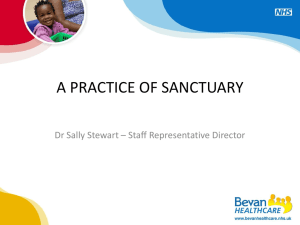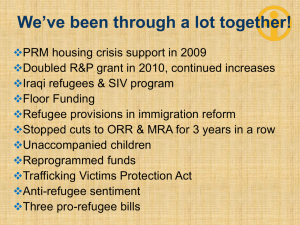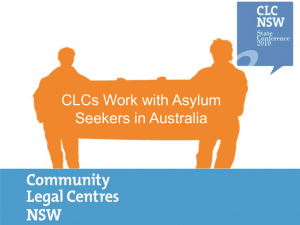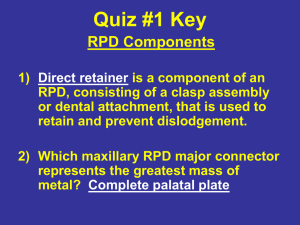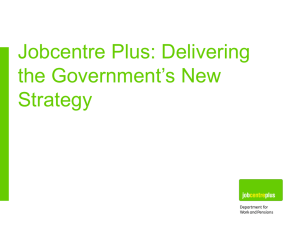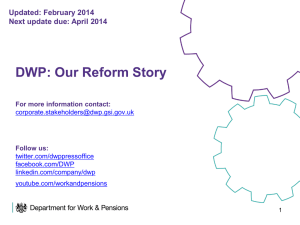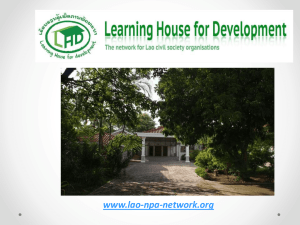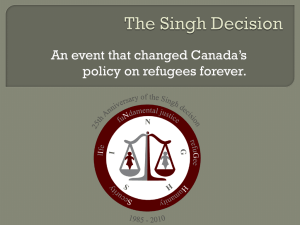Refugee law services reform
advertisement
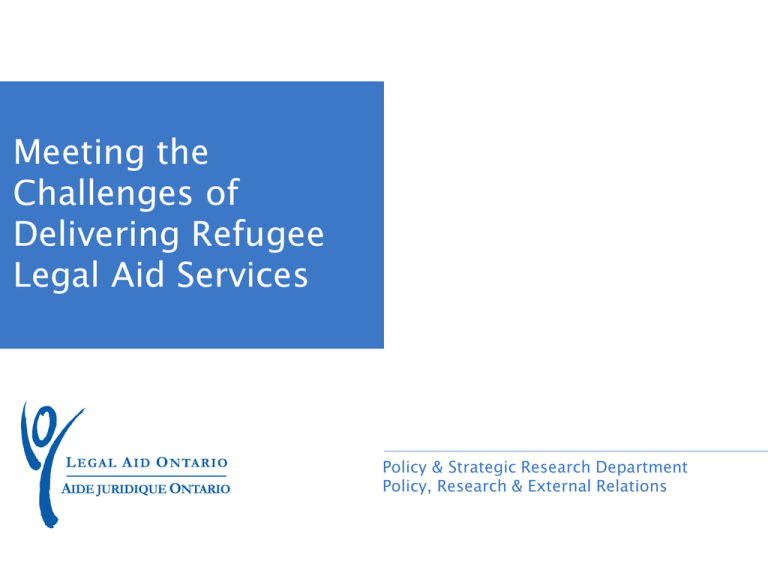
Meeting the Challenges of Delivering Refugee Legal Aid Services Policy & Strategic Research Department Policy, Research & External Relations Meeting the Challenges of Delivering Refugee Legal Aid Services INTRODUCTION 2 Importance of Legal Aid Services for Refugees • It is important that LAO provide legal aid services to refugee claimants. • Many refugees will not have the funds or necessary supports to pay for representation before the IRB, nor will they be able to advance their case without legal assistance. • Legal aid assistance can make the difference in ensuring that the rights of refugees are protected. • The 1996 Ontario Legal Aid Review, A Blueprint for Publicly Funded Legal Services, stated that “refugee claimants risk return to a country where they could face imprisonment, torture or death because of who they are or what they believe.” 3 What’s Driving Change in Refugee Legal Aid? • Changes in refugee legal needs and service delivery are being driven by: – New legislation – LAO budget situation/lack of new resources – LAO reform and modernization 4 Client Needs and Refugee Legal Aid • Current system of providing refugee legal aid largely unchanged for almost twenty years • Current system not a good match for changing legal needs due to new legislation • Current system does not meet other pressures/opportunities • LAO believes client needs may be better served by developing new service model 5 NEW FEDERAL LEGISLATION 6 New Legislation • The Protecting Canada’s Immigration System Act (PCISA) is expected to come into force by mid-December. • The Act changes refugee legal needs through substantial changes to the refugee determination system: Faster time lines for processing cases Basis of Claim (BOC) initiates the process Introduction of new appeal division (RAD) Designation of countries that produce few refugees or have low success rates, and procedural differences for claimants from these countries – Faster removals for unsuccessful claimants – No pre-removal risk assessments (PRRAs) for one year after rejection of RPD claim – – – – 7 Changes in Refugee Determination System Current Legislation New Legislation 28 days to submit Personal Information Form (PIF) 15 days to file Basis of Claim (BOC) when claim for refugee status made at port of entry; inland claims file BOC when making claim No authority to designate countries Naming of designated countries of origin (DCOs), based on high rate of rejection by IRB of claims from those countries and high number of abandoned claims 8 Changes in Refugee Determination System Current Legislation New Legislation RPD hearing conducted by Governor in Council appointees with no set standards for time Refugee Protection Division (RPD) hearing conducted by public servant decisionmakers within 30 days for inland DCO claims and 45 days for port of entry DCO claims; all other claims to be heard within 60 days No appeal division of IRB Appeal to RAD available all claimants except from DCOs, designated irregular arrivals, claims found by the RPD to be manifestly unfounded/without credible basis Cases referred to the IRB before coming into force of new legislation have no access to RAD Appeal to be filed and perfected within 15 working days 9 Changes in Refugee Determination System Current Legislation New Legislation Claimants may seek leave in Federal Court Claimants with no access to RAD may for judicial review of negative RPD seek leave in Federal Court for judicial decisions review of negative RPD decisions Claimants whose appeals to RAD are rejected may seek leave in Federal Court for judicial review of RAD decision 10 Changes in Refugee Determination System Current Legislation New Legislation Availability of pre-removal risk assessment (PRRA) prior to removal Cannot file a subsequent PRRA for one year after receiving negative PRRA decision Recent restrictions placed on access to Faster removals after receipt of negative humanitarian and compassionate application decision for one year after rejection or abandonment of RPD claim, except where best interests of children are involved or there is life-threatening medical condition for which there is inadequate care in country of origin No access to humanitarian and compassionate (H&C) application for one year after a negative RPD decision (except where would affect best interests of children or where there is risk to life caused by medical condition where there is inadequate care in country of origin Cannot bring simultaneous H&C and RPD applications 11 OTHER FACTORS DRIVING REFORM 12 Costs and Resources • LAO’s financial resources are limited and refugee costs are growing • LAO has a fixed annual budget yet in past five years: – # of certificates for refugee matters has increased 20%, while criminal certificates have increased by 2% and family certificates have been reduced by 16% – Total expenditures on refugee legal aid has increased 45% (only small fraction attributed to tariff.) • More money for refugee services mean reductions in criminal, family or clinic services • LAO has a structural deficit and potentially significant unfunded liabilities – Law Foundation of Ontario (LFO) revenues decreased by $50M or 90+% in 2009/10 – Potential shortfall in funding recent tariff increases beginning in 2013/14 • LAO can’t assume increased revenues from governments or LFO 13 Legal Aid Modernization • LAO has developed a continuum of services that matches service to client needs at each stage of the proceeding • Continuum expands access to justice by committing LAO to target legal resources thoughtfully and strategically • The continuum: – Provides the most cost-effective service at each stage of a proceeding – Departs from historic assumption that all clients should receive full certificate, regardless of the complexity of the case – Targets resources where they can assist clients most effectively – Expands range of service options to meet client needs – Certificates are reserved for more complex cases and where full representation is likely to benefit clients the most • LAO now applies continuum in criminal and family law through summary legal advice, duty counsel, staff offices, certificates, etc. 14 Continuum of Services 15 Other Provincial Legal Aid Plans British Columbia Primary reliance on private bar, with some duty counsel services Alberta Primary reliance on specialized staff offices, with private bar lawyers filling in when staff counsel not available Manitoba Primary reliance on private bar Quebec Primary reliance on private bar, with payment covered by block fees, and some staff lawyers in Montreal Newfoundland Staff lawyer handles refugee cases Please consult Appendix A in Discussion Paper for more detail on other provincial legal aid plans. 16 LAO’S PROVISIONAL SERVICE MODEL FOR REFUGEE LEGAL AID SERVICES 17 LAO’s Provisional Model – Guiding Principles • LAO has developed provisional model for delivering refugee legal aid services. • LAO believes model is better-suited to meeting current challenges while ensuring that refugee claimants continue to receive high-quality services. • Model is consistent with continuum and current delivery of refugee services in many significant respects: – Private bar/certificates remain but are not near-exclusive means of delivering services. – Certificates supplemented by LAO staff lawyers, duty counsel, and paralegals where appropriate. – Approach is consistent with LAO services in criminal and family law. • Organizing feature is match between level/type of service and client legal need. • LAO is presenting model to generate discussion and constructive commentary. 18 LAO’s Provisional Model – Intake • New legislation has expedited timelines, especially at the front end of the process, which place a premium on early merit screening and triage of the client’s needs. • Proposed intake process – LAO proposes staff screening of client needs at intake stage in order to direct client to the appropriate service. Goal is to ensure clients are moved into appropriate service stream without delay. • Screening based on country of origin – LAO proposes that staff who conduct screening triage cases primarily according to country of origin. 19 Provisional Service Model – Country of Origin Countries with greater than 90% acceptance rate • Claimants from these countries are likely to succeed. As a result, these claimants arguably require less legal advocacy to advance their cases. Resources for full legal representation might be more effective elsewhere. • Legal needs for majority of claimants from these countries might be served by: – – – – Website referral Summary legal advice Legal assistance to prepare BOC Duty counsel services prior to RPD hearing • Full representation at hearing could be reserved for clients with special needs or unaccompanied minors. 20 Provisional Service Model – Country of Origin Questions for discussion • How should LAO prioritize claimants from countries with a greater than 90% success rate? • Is representation always necessary in these cases or should resources be targeted to other legal needs? • Are there other legal services that would be needed by clients in this group? • Are there alternative means of meeting the legal needs of this client group? 21 Provisional Service Model – Country of Origin Countries with 25-90% acceptance rate • Success at RPD hearing for clients from these countries may depend on legal representation. These hearings are more likely to involve contested evidence and be adversarial. As a result, these claimants’ needs are a high priority for full representation and comprehensive legal aid services. • Legal needs for claimants from these countries might be served by: – – – – • Website referral Summary legal advice Legal assistance to prepare BOC Full representation at RPD hearing In certain situations, legal services for claimants from these countries offer potential for economies of scale by savings on country research, country specialization or new fee arrangements such as block fees and service contracts. 22 Provisional Service Model – Country of Origin Questions for discussion • How should LAO prioritize claimants from countries with a 25%-90% acceptance rate? • Is representation necessary in these cases or should these resources be targeted to other legal needs? • Are there other legal services that would be needed by clients in this group? • Are there alternative means of meeting the legal needs of this client group? • Are there opportunities for economies of scale, specialization, and/or alternative fee arrangements to improve the quality or efficiencies of these matters? 23 Provisional Service Model – Federal Designated Country List • Claimants from countries on Federal Designated Country (DCO) list are less likely to be successful, either with full or partial representation. As a result, they may be a lower priority for legal aid services. However, there will be exceptional cases where nature of the claim indicates a real possibility of success. System must be able to identify these claimants and refer them to full services. • Legal needs for majority of claimants from these countries might be served by: – Website referral – Summary legal advice – Legal assistance to prepare BOC • Model could offer full or partial representation at RPD hearing in exceptional circumstances 24 Provisional Service Model – Federal Designated Country List Questions for discussion • How should LAO prioritize claimants from countries on the federal Designated Country list? • Is full or partial representation necessary in these cases, or should these resources be targeted to other legal needs? • Are there other legal services that would be needed by clients in this group? • Are there alternative means of meeting the legal needs of this client group? 25 Provisional Service Model – RAD Appeal • RAD appeal is a new level of appeal not available to claimants from countries on the DCO list, claimants designated to be part of an irregular arrival, or those whose claims the RPD concluded were manifestly unfounded or without a credible basis. • Appeals are conducted mostly in writing, with oral hearings the exception, and must be perfected and filed within 15 working days. • LAO needs to prioritize how to provide this service and develop process for screening service, based on the materials filed at the RPD hearing, the RPD decision and RAD jurisprudence. • Legal needs for claimants seeking RAD appeal might be served by: – Assistance preparing and filing appeal (written argument) – Representation when oral hearing conducted 26 Provisional Service Model – RAD Appeal Questions for discussion • How should LAO prioritize RAD appeals? • Given the short time frame in which to file and perfect an appeal, what is the optimum way to meet the needs of these clients? 27 Provisional Service Model – Judicial Reviews • There may be fewer judicial review applications because of the RAD. Claimants who were not successful at RAD may seek judicial review. Those for whom RAD not available will only have judicial review as a way to overturn a negative decision, but will need to bring an application to stay removal. • Client needs are more demanding and complex at this level, and require legal representation. • Effective merit screening needed to fund only those cases where there is a reasonable likelihood of success 28 Provisional Service Model – Judicial Reviews Questions for discussion • How should LAO prioritize applications for judicial review? • Are there other legal services that would be needed by clients in this group? • Are there alternative means of meeting the needs of this client group? 29 Alternative Intake Alternative Intake and Service Approaches • Provisional model “streams” clients based on a claimant’s country of origin and IRB acceptance rates. • There may be alternative intake processes and service approaches. Alternative Delivery and Payment Approaches • LAO has authority to use wide range of service providers. For example, paralegals now authorized to appear before IRB. • LAO also has authority to use wide range of alternative fee arrangements, such as block fees, service agreements, etc. 30 Alternative Intake and Service Approaches Questions for discussion • Are there other models available that would address the legal needs of refugee claimants in contemporary circumstances? • What relative priority should be given to the legal needs identified in this paper and what is the best way of ensuring high-quality, cost-effective legal aid services? • What alternative fee arrangements could be piloted for private lawyers providing refugee legal aid services? 31 Implementation and Transition Planning • It is expected that the consultation with stakeholders will not be completed when the new legislation comes into force. • LAO is developing a transition plan that will ensure that legal aid services will still be available for eligible refugee claimants and that will provide a smooth transition from the old system to the new regime. • The model that is developed as a result of the consultations will be a work in progress that will continue to evolve over time as LAO and its stakeholders adjust to the new refugee determination system. 32


